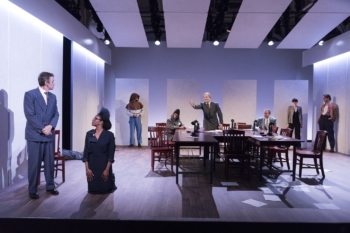
- Talkin' Broadway October 10, 2017
- Theatre Reviews Limited October 10, 2017
- The Daily Beast October 10, 2017
- 4Columns October 13, 2017
- Time Out NY October 10, 2017
A CurtainUp Review Measure for Measure
By Dierdre Donovan
I’m especially glad to be staging one of Shakespeare’s notorious “problem Plays.” Theatrical problems are ER’s bread-and-butter. — from program note by John Collins, Elevator Repair Service’s artistic director and this Measure For Measure‘s director.
The poet Samuel Coleridge was not alone in regarding Measure for Measure as one of Shakespeare’s problem plays. He most famously found fault with it in one of his lectures, describing it as “the only painful part of his genuine works.” Yet, critics like Coleridge have failed to be a death sentence for this resilient play. In fact, Coleridge’s pointed antipathy was exactly what prompted Elevator Repair Service, known for its retooling of 20th Century literature, to choose this problem play for its first take on Shakespeare. After, all, per the above quoted program note by John Collins, the company founder and this Measure for Measure‘s director, “theatrical problems are ERS’s bread-and-buttter.”
In their first go at Shakespeare, Collins and the Elevator Repair Service ensemble mostly land on their theatrical feet — with a little help and shtick from the legendary Marx Brothers. Those who frequent downtown theater venues need no introduction to ERS. Since it was founded by Collins in 1991, the company has turned literary texts and cultural artifacts into theatrical gold though many know it mostly for Gatz, their six-and-a-half-hour-long dramatized reading of The Great Gatsby. It’s difficult to put the ERS style into any precise category. Suffice it to say that their oeuvre is flavored with Da-da-ism, the absurd, and the ridiculous.
Having seen several Measure for Measures on the New York boards this past year (most recently Desperate Measures a Measures-inspired musical), I wondered if it was possible for me to watch another production of this tragicomedy without stifling a yawn. Fortunately, the answer is yes. ERS takes the play to a new space of feeling and being letting its tragic and comic elements intersect provocatively.
Excerpt from “A CurtainUp Review Measure for Measure” By Deirdre Donovan. Read the full article here.